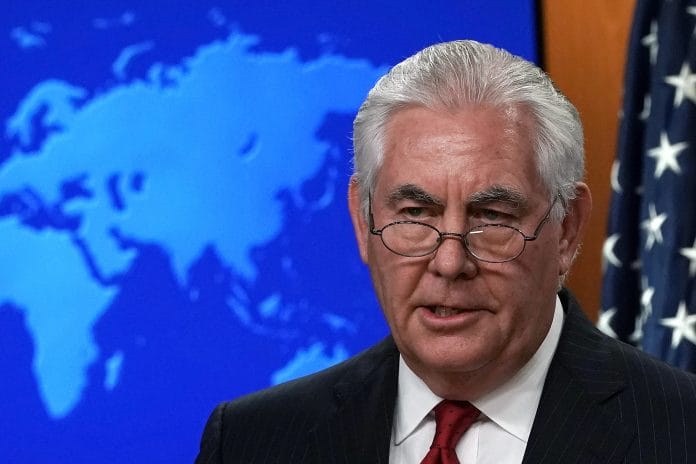The instability we’ve seen in the White House, illustrated by a high turnover rate in key positions, is viewed as a red flag by the international community. Tweets and position shifts do not help.
When news broke Tuesday morning that President Donald Trump had ousted US secretary of state Rex Tillerson, most of the media attention surrounding the decision was focused on the ‘how’ — how did President Trump inform Tillerson of his decision, and why did he announce the removal of the nation’s top diplomat via a tweet?
While it’s only natural for the media to focus on the logistics in the immediate aftermath of a decision of this magnitude, more important questions loom with Tillerson’s acrimonious departure. It’s crucial to ask what this personnel shift means for US foreign policy, and what key factors are going to impact the country’s most important diplomatic relationships in the future.
First, it’s impossible to effectively enact foreign policy from a state of extreme volatility, be it perceived or real. The instability we’ve seen in the White House since President Trump took office, illustrated by a high turnover rate in key positions, is viewed as a red flag by the international community. Tweets and position shifts do not help. While the President insists that his administration isn’t in chaos, 43 per cent of the top-level positions in his White House have seen turnover. This is far from normal and does indeed project a state of uncertainty to our allies around the world.
Second, President Trump has yet to make key appointments in the state and defense Departments. Of the United States’ 188 embassies and missions to international organisations, 44 still lack an ambassador. This includes some of the most important strategic allies for the US, such as Germany, Saudi Arabia, South Korea, and Turkey. With so many crucial allies without a permanent US representative, it will be imperative for the new secretary of state to fill as many of these positions as possible. Allies expect certainty and stability from the US state department, and the lack of key ambassadors hinders the ability of the US to lead across the world.
Third, as is the case with any major personnel change, growing pains are to be expected. President Trump has announced his intention to nominate CIA director Mike Pompeo as the next secretary of state. It will take some time to assess how well director Pompeo will work with secretary of defence Jim Mattis and national security adviser General H.R. McMaster. This begs the question — whom will the President seek out on foreign policy counsel and advice moving forward? It will also be important to see if the change in secretary of state signals an immediate shift in the United States’ Iran policy, as the policy views of secretary-designate Pompeo and President Trump on this are much more closely aligned.
Finally, what does this all mean for the United States’ friends and partners around the globe? A sudden change at the top of the state department is a significant disruption that creates uncertainty and potential policy inconsistencies. This ambiguity risks producing a power vacuum in key areas around the world. Already we are seeing Russia stepping into that vacuum in eastern Europe, and China asserting itself everywhere from the South China Sea to Africa and Latin America. I certainly hope this is not long-term as United States diplomacy and our business interests can ill-afford to lose footing in a region as crucial as Asia.
In the widely respected book titled ‘Team of Rivals’ President Lincoln welcomed diverse thoughts and opinions. Now, without Tillerson’s viewpoint, the President is less likely to be challenged and will undoubtedly have a smoother time directing his foreign policy vision moving forward. Questions remain of whether or not the President has a larger team of diverse opinions informing and guiding his world view, and whether, after Tillerson’s removal, they will have the courage and resilience to put them forward. The world is paying close attention, especially Russia and China.
Tim Roemer is a former US Ambassador to India and former US member of Congress from Indiana. He is an executive director at APCO Worldwide with offices in New Delhi and Mumbai.






